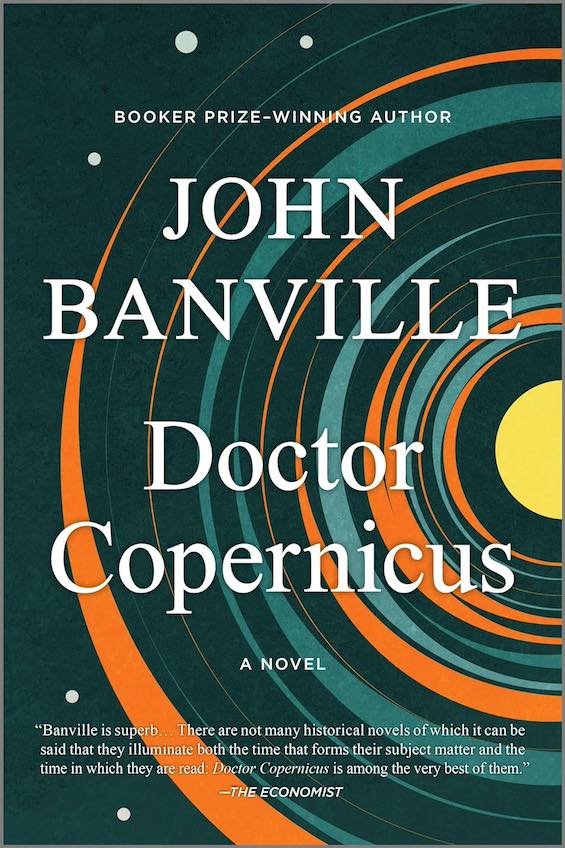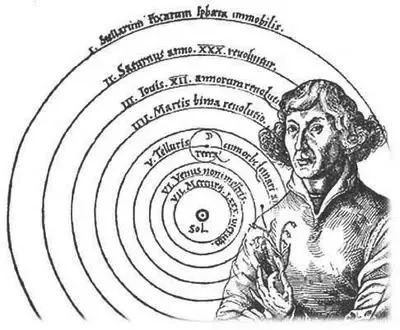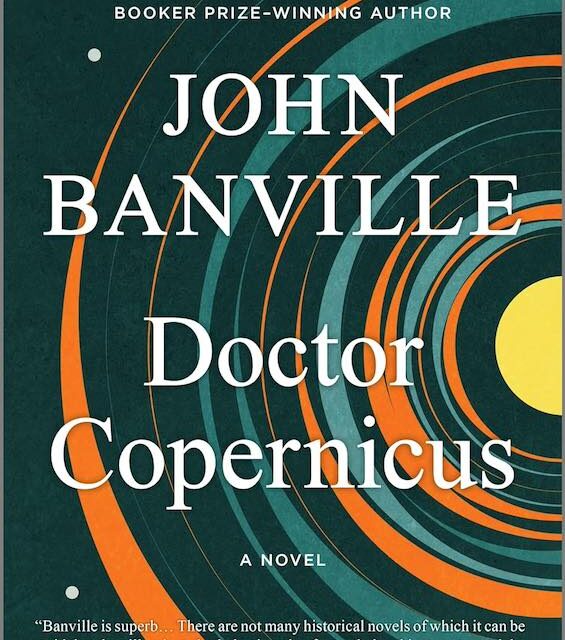
Estimated reading time: 5 minutes
For nearly fifteen hundred years Europeans regarded the Roman-Egyptian astronomer Claudius Ptolemy (100-170) as the ultimate authority on humanity’s understanding of the universe. He viewed the Earth as the center of the universe. The moon, the planets, the sun, and the stars circled around it in concentric circles. It was not until the turbulent years of the Reformation in the sixteenth century that a contrary view took hold. Then, a German-speaking Polish astronomer named (in Latin) Nicolaus Copernicus (1473-1543) postulated a new model of the universe. For him, the sun was at the center, and the Earth one of the planets that circled it. To the scholars of the age, the Copernican theory was revolutionary. It deeply influenced the later work of Galileo Galilei, Johannes Kepler, and Isaac Newton, presaging our understanding of the universe in the twenty-first century. Now here, in Doctor Copernicus, the Irish Booker Prize-winning author John Banville gives him his due in a short, fictionalized Copernicus biography. It’s the first of three books in his Revolutions Trilogy, which also includes Kepler and Newton.
A German-speaking astronomer in Martin Luther’s time
He was born Nicolaus Koppernigk in 1473 of German-speaking parents in his mother’s Polish home town. They were wealthy merchants on both sides of the family, though his mother’s was of noble stock. The boy was exceptionally bright and, from an early age, his Uncle Lucas. a Canon of the Church, singles him out for the priesthood. As a student he gravitates toward mathematics and astronomy.
When still a teenager, he detects the flaws—and there are many—in Ptolemy’s concept of the universe. Over the course of his life, he gradually begins to share with friends and sympathetic teachers his evolving contrary view of the solar system. But everywhere he turns there is fierce resistance. And as he grows older, and gains an elevated position as Canon Koppernigk, the criticism grows more virulent. Outspoken enemies bedevil him everywhere. His sadistic brother Andreas and his uncle, now a Prince-Bishop in Polish Prussia, are first among them. And his masterwork, De revolutionibus orbium coelestium (On the Revolutions of the Celestial Spheres), remains unpublished. The work sees the light of day only as he lies on his deathbed. And it is a Lutheran who arranges it, introducing it as an anti-Catholic text—a lamentable fate for a devout Canon of the Church.
Doctor Copernicus (Revolutions Trilogy #1) by John Banville (1976) 257 pages ★★★☆☆

His masterwork published only as he lies on his deathbed
Doctor Copernicus is oddly structured. The first two of the book’s four chapters present a straightforward fictional account of the man’s life, written in the third person. The third consists of letters sent to, from, and about Canon Koppernigk. And the fourth is the story of the astronomer’s final decline in the voice of a mad Lutheran student from Germany, who pesters Koppernigk relentlessly for weeks for permission to publish De Revolutionibus. Listening to the audio edition of this novel, I found the change of pace and format especially jarring. And the narrator made the experience worse by voicing almost every character other than Koppernigk himself in a nasal, sneering tone. If I do later decide to read the Kepler and Newton volumes that follow Doctor Copernicus, it will certainly not be their audio editions if the same narrator is at work. However, I must admit that, as always, Banville’s prose is glorious. He has long been known as one of the most celebrated stylists in the English language.
About the author

John Banville was born in Wexford, Ireland, in 1945 and educated locally. He did not attend university. He published his first novel at the age of twenty-six in 1971. The Revolutions Trilogy (Doctor Copernicus, Kepler, and The Newton Letter) followed from 1976 to 1982. Since then, he has published a total of twenty-one novels under his own name as well as the nine novels of the Quirke series under his pseudonym, Benjamin Black. Banville is widely considered to be a contender for the Nobel Prize for Literature. He lives in Dublin.
For related reading
You may also enjoy The Quirke series of Dublin crime novels from Benjamin Black.
And you may wish to check out another Dublin crime novel written by John Banville under his own name: Snow (John Banville launches a new detective series).
I have also reviewed four other John Banville books published under his pseudonym, Benjamin Black:
- The Black-Eyed Blonde, resurrecting Raymond Chandler’s iconic sleuth, Philip Marlowe (Benjamin Black brings back Philip Marlowe)
- The Lemur, set in contemporary New York City and Dublin (A murder mystery from a master stylist)
- Wolf on a String (A murder mystery set in the Holy Roman Empire)
- The Secret Guests (Booker Award winner Benjamin Black returns to historical fiction)
You might also care to check out the Top 10 great popular novels.
And you can always find my most popular reviews, and the most recent ones, on the Home Page.



























